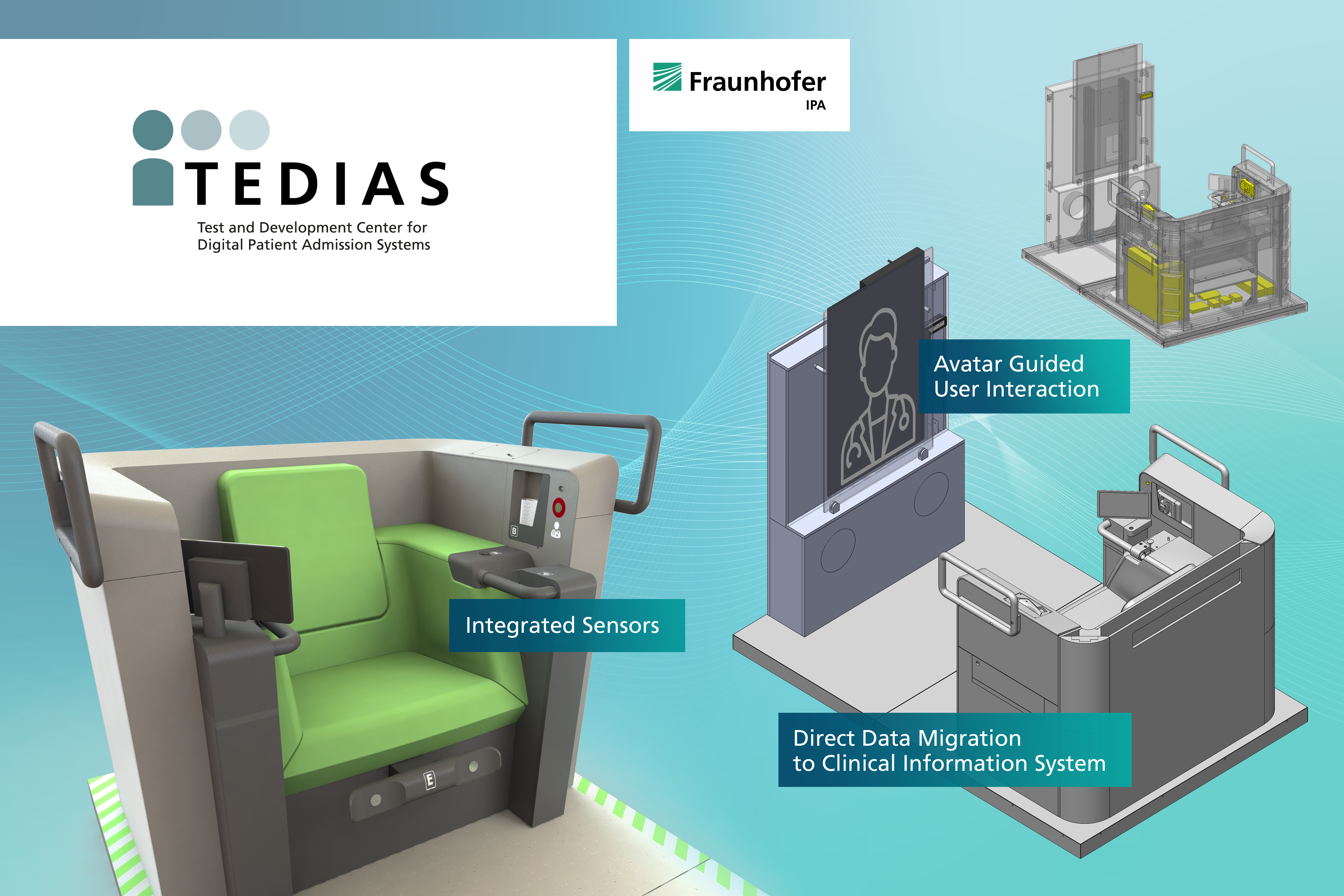
TEDIAS

TEDIAS – Test and Development Center for Digital Patient Admission Systems
Everyone who has ever visited a doctor’s office or a hospital knows it: Before a treatment can take place, the doctor asks a few questions about the current patient’s health status. During the so-called anamnesis interview, the patient’s medical data and previous medical history are going to be documented. Often, first basic medical data, so-called vital parameters, such as heart rate and respiratory rate are recorded. This is the only way to subsequently carry out further diagnostic and therapeutic processes and to monitor the patient's progress.
As the starting point of any medical treatment, patient admission has a decisive influence on all subsequent processes and ultimately on the success of treatment. Correct and uniform recording of all relevant patient data is therefore enormously important. Currently, these important processes require a great deal of time and staff, and the documentation of data is often inconsistent. This often leads to duplicate queries, stress for medical staff and long waiting times for patients.
How can everyday hospital life be improved with the help of digitization?
Researchers from the "Clinical Health Technologies" department of the Fraunhofer Institute for Manufacturing Engineering and Automation IPA in Mannheim have tackled this problem. They have asked themselves how medical staff in hospitals can be relieved of workloads through digitisation and, at the same time, how patients can be brought more into the focus of processes. Together with an interdisciplinary team of physicians from Mannheim University Hospital and experts from other disciplines, they are developing and testing automated systems at the test and development center for digital patient admission systems, or TEDIAS for short, to make patient admission more efficient.

The automation of medical patient admission provides relief in everyday hospital life
The goal of TEDIAS is to automate the routine processes involved in medical admission for a clinic in such a way that staff are relieved, duplicate queries are avoided and, at the same time, high-quality data is generated that is necessary for further treatment, subsequent check-ups and research work. Among other things, integrated sensors for the automatic recording of relevant vital parameters are integrated for this purpose. All patients have to do is sit down on a chair. In the time they would otherwise spend waiting, TEDIAS can be used to measure, among other things, their heartbeat, blood pressure, blood oxygen saturation, hand strength and temperature of the persons. At the same time, a virtual doctor asks for the patient's medical history and symptoms and informs the patient about the upcoming treatment. Instead of spending a lot of time in the waiting room, the patients are actively involved in the actual admission process and the medical staff can be relieved.

TEDIAS as foundation for the digital hospital in the future
The evaluation of the data takes only a few seconds and can be electronically transmitted to the attending physicians in advance of the examination. A connection to the usual hospital systems is necessary for this. By making patient admission more efficient, more time is left for the actual examination and treatment of patients.
TEDIAS is intended to create a basis for the digital hospital of the future. The test and development center is located on the grounds of the University Medical Centre Mannheim and offers space for technical testing and further development as well as for testing clinical applications in real hospital processes with patients. The project is funded by the Forum health-location Baden-Württemberg and the Ministry of Economics, Labour and Tourism.

Our offer – a framework for the development and validation of digitisation solutions in an integrated setting.
Digitized and automated patient admission offers enormous potential not only for reducing waiting times for patients, but also for increasing the efficiency of medical processes.
An appealingly designed patient interaction, adaptive questionnaires, integrated measurement technology, automatic data evaluation and storage of data in the hospital information system can work together – ensuring patient involvement and continuous information, a reduction in administrative and documentation activities and an increase in data quality for research purposes. It is important that there is continuity of data between the individual systems and an orchestration of the entire admission process.
To achieve this, TEDIAS creates a framework in which these components interact and can be easily supplemented or replaced. This creates the ideal conditions for developing and validating innovative digitalisation solutions and measurement technology for the healthcare sector in an integrated setting in the hospital. The TEDIAS consortium offers an interdisciplinary team of doctors, nurses, engineers and developers for this purpose.

The consortium with our partners

 Research area »Healthcare Technologies and Processes«
Research area »Healthcare Technologies and Processes«